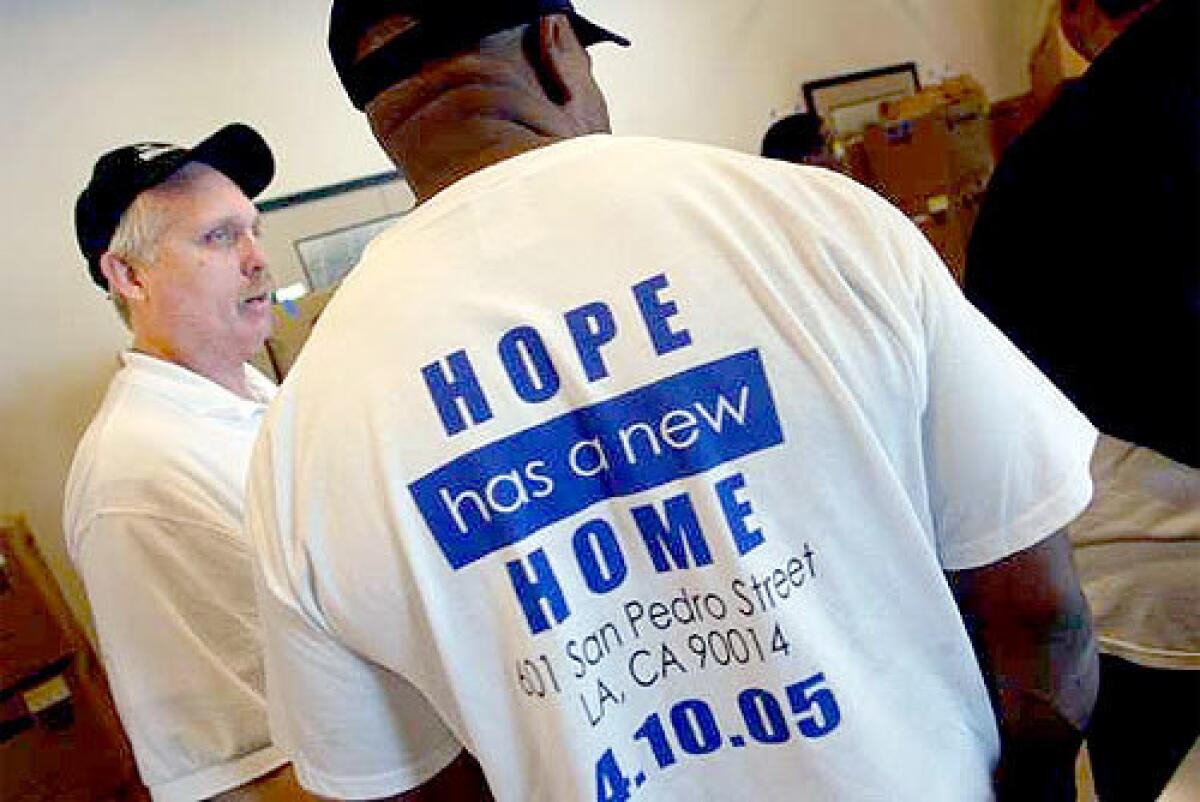Former Exec Turns Talents to Aiding Homeless

A few weeks after the new $17-million Midnight Mission for the homeless opened downtown this spring, Larry Adamson still was getting used to the building that is likely to become his legacy.
At the time, only half of the phone lines worked, e-mails arrived sporadically, and the fire alarm sensors and boilers were herky-jerky.
But it would have been hard to find someone better able to cope than Adamson. For 23 years, he was vice president of administration for the Automobile Club of Southern California, where he oversaw the acquisition of nearly all the company’s offices in the region and a $400-million annual budget.
“One of my former Auto Club colleagues said jokingly, ‘You just can’t get away from real estate, can you?’ ” Adamson said.
Adamson is a new breed of social agency director: a no-nonsense businessman with virtually no background in social services. The board of directors that seven years ago named him president and chief administrative officer of the Midnight Mission considers that a major asset.
Adamson “was invaluable for our efforts in building the new facility and saved us quite a bit of money,” said David R. Doan, a mission board member and LAPD deputy chief, who has known Adamson since the two were schoolboys.
The Midnight Mission, an independent agency with no religious affiliation, opened its new facility in April at 6th and San Pedro streets, a few blocks from its former home downtown where affluent loft-dwellers, cafes and galleries commingle with thousands of homeless residents.
Showing off the cozy library, spacious day room and sweeping, light-drenched staircase at the new 123,000-square-foot Mission, which has 360 beds and seats 500 for meals, Adamson said, “I think what I brought to the table is how to get this done.”
Adamson is a hands-on administrator, one who will walk into the main lobby to ask clients how they’re being treated.
“I’ve tried to instill in my people that they’re not to be herded like cattle; they’re to be treated like human beings,” he said.
Adamson has graying hair, a graying mustache and a weary gaze that he insisted was not totally the result of the new building.
He has the good executive’s knack of never appearing to be frazzled, even while hosting visits by an endless stream of city inspectors.
His job would seem to be the ultimate bleeding-heart endeavor, but he said, “I’m not a traditional liberal and, in fact, my upbringing was quite conservative.”
Adamson, who with his wife has two adult daughters, was born and raised in Venice, graduated from Venice High and Cal State L.A., and grew up venerating the Dodgers.
A former Los Angeles police officer, he became a senior executive of the nation’s biggest auto club in the car culture capital of the world, and now heads one of Los Angeles’ oldest social agencies.
The diversity of his experiences exposed him to the city’s riches and its unsavory depths. But it was his parents who taught him the importance of caring for his neighbors.
“My brother and I never had to worry about bringing home a friend unannounced because it was always an open door,” Adamson, 53, said.
“My mom always had 15 dishes on the table, and my dad said, ‘I don’t care what a person’s station is in life; that could be you.’ ”
Adamson had considered coaching high school football or baseball, sports in which he had excelled. But at Cal State L.A., he became fascinated by the psychology of crime — so much so that he entered the Los Angeles Police Department Academy and in 1974 was assigned as an officer to the Pacific Division.
His law enforcement career, however, lasted only a year. Adamson said he quickly realized that confrontation was not his forte.
“I knew I could do other things, and a little bit of capitalism took over,” he said. “I still stay close, though. A son-in-law is an LAPD officer and I have the utmost respect.”
But Adamson said his education and experience helped him understand the needs of the homeless and addicted men and women who for 92 years his organization has helped.
Before he became president, he spent six years on the board of directors and became versed in the theories of the 12-step recovery program used at the Midnight Mission.
The hardest transition, he said, was learning to allow someone to fail. Curtis Carter, for example, has been in and out of Midnight Mission’s programs since 2000, often succumbing to addiction and arrest while living on skid row.
In steady recovery for six months now, he is the facility’s resident barber.
“Every time I came back, Larry welcomed me back with open arms,” Carter, 44, said. “We’d chat for a few minutes and he’d tell me to keep up the good work and offer nothing but encouragement.”
But Adamson also likes to see results from clients like Carter and from his staff. He admitted to a competitive streak stoked as an athlete and a coach of his two daughters’ softball teams.
“I use those kinds of sports analogies with the management staff, like, ‘Come on guys, it’s the ninth inning, let’s close this deal,’ ” he said.
“That background also led me to value the notion of teamwork. Team dynamics are also an important lesson learned in sports that you transfer to business.”
Many social agencies that started as mom-and-pop operations, with more good-heartedness than know-how, now require directors who can manage a large staff and go after the millions of dollars needed to stay afloat.
Adamson and the fundraising chairman, actor Dick Van Dyke, raised the money for the new Midnight Mission from private donors. The mission’s annual operating budget is $6 million.
“There is a trend in applying more of a business model in the not-for-profit world,” said Mitchell Netburn, executive director of the Los Angeles Homeless Services Authority, a city/county agency that administers government homeless funds.
“In the past, social service agencies would really just talk about the ‘good works’ they did,” Netburn said. “Now the government and foundation want to see outcomes, and they are turning to people with that kind of background.”
Adamson said he is ready for his next project. Midnight Mission has a transitional housing program for families near Inglewood, and he would like to see additional facilities opened around the county.
Adamson is undaunted by community resistance. He was a Los Angeles Homeless Services Authority commissioner when the city of Santa Clarita chose not to reopen a winter shelter that had operated for several years.
Instead, the city planned to pay to transport homeless people to shelters in the San Fernando Valley and downtown Los Angeles.
A deal eventually was worked out, but Adamson, a Santa Clarita resident, said, “I was ready to make it clear to them what I thought their responsibilities should be.”
*
(BEGIN TEXT OF INFOBOX)
Man on a mission
Adamson is a trustee of the California State University system and likes to visit campuses during commencement. When daughters Diana and Melissa graduated from Chico State and Cal State L.A., respectively, Adamson arranged to hand them their diplomas.
He spent eight years coaching top-flight girls softball teams, and in 1994, one of his teams, the Snipers, was invited to the American Fastpitch Assn. championships, where it placed sixth in the nation.
The Adamsons named their 7-year-old black Labrador retriever Midnight.
The grand opening of the new Midnight Mission had long been planned for April 10, and one of the most stressful periods was waiting for approval from city inspectors, Adamson said. The final permit was signed only 48 hours before the gala.
*
Los Angeles Times
More to Read
Sign up for Essential California
The most important California stories and recommendations in your inbox every morning.
You may occasionally receive promotional content from the Los Angeles Times.











